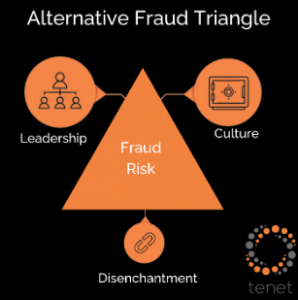Beyond the red flags

In this article, Arun Chauhan, fraud specialist and founder of multi-award winning disputes and compliance law firm Tenet delves into the connection between fraud prevention, the fabric of corporate culture, and the pivotal role of leadership, revealing that engaged employees aren’t just a defence against fraud, they’re the driving force behind a culture of ethics and a roadmap to unshakeable success.
If you want to learn more about safeguarding your business through good practice as it continues to grow join Arun and a panel of inspiring leaders at our upcoming Seminar: The Pursuit of Opportunity where four of the most dynamic entrepreneurs in the West Midlands discuss their personal journeys and how they disrupted their respective markets whilst mitigating great risk.
The Cost of Fraud
Fraud poses a major threat to every business all around the globe. From charities and housing associations to food and sport – every sector is subject to fraud risk.
The challenge of combatting fraud is ever-increasing. According to Crowe’s 2023 Financial Cost of Fraud report, the UK loses close to £219 billion to fraud-related crimes each year. Research indicates that the actual figure could be significantly greater, as instances of fraud remain undiscovered or unreported.
Fraud doesn’t just harm an organisation’s profitability; it also diminishes the quality of public services directly impacting each one of us. And let’s not forget the profound impact it has on individuals who have unfortunately become victims, both in terms of their financial loss and their mental health. Investing in fraud prevention is absolutely vital, especially now. While risk policies and anti-fraud processes play a crucial role in the fight against fraud, the tone from the top is an essential element of any fraud detection strategy.
The Power of Leadership and its Influence
A business’s leadership team plays a pivotal role in its growth. Leadership style influences the tone of corporate culture, the engagement of a team and, ultimately, the sustainability of a business’s success. Leadership also has the potential to increase or decrease the risk of internal fraud. This is not leadership in the sense of governance through processes and procedures but with respect to what can be described as the culture created by leaders.
Leaders who place focus on building a positive working culture which is aligned with their whole team will enjoy a highly motivated team who are all pulling in the same direction, driven by the same mission. Engaged employees are more likely to ‘buy into’ why compliance is needed and appreciate its value in protecting the business and the whole team.
Whatever level they sit within their organisation, every leader values an environment that allows them to perform to the best of their ability. There are a variety of perspectives on how leaders achieve success. Some are driven by metrics, look to meet or exceed defined targets, enhance team productivity or contribute to building the business. To achieve the personal success they strive for, some leaders might choose to implement performance benchmarks for their team, such as profit or output targets. These benchmarks are designed to monitor how well the team is performing to gauge how close the leader is to achieving the targets set upon them and their personal goals.
However, this drive for personal success should not come at the cost of a happy, engaged and motivated team. This can be counter-productive and result in not achieving the desired objectives. If leadership style is contributing to a toxic working culture which drives pressure and stress from the demands of senior management, a team’s motivation and engagement will likely be hampered.
If you’re a leader and you lose the engagement of your team, you will also quickly begin to lose their care and as a result, their trust in and respect for your business will rapidly decline. This loss of care – and general disenchantment with the business, its leaders and their role – combined with a pressurised, stress-inducing work environment, will, over time, begin to leave employees feeling highly emotionally drained.
This mental exhaustion will often distort an employee’s ability to make morally sound decisions which are aligned with an organisation’s core ethics and beliefs. In this scenario, employees are increasingly under pressure to make behavioural choices which would usually be seen as out of character.
Culture: Why you should care
For those who own a business, your culture is your ‘DNA’. It underpins everything you say, everything you do and everything others say about you. It’s the unique way you operate. Your culture influences how others, such as your team and your customers, view your business.
The culture in any business is heavily driven by its leadership. Pressures created by leaders upon their employees can lead to a toxic working culture which fosters poor team motivation and dysfunctional engagement.
A negative culture can invite myriad risks to a business. Most importantly, a negative culture has been shown to lead to disenchanted and disconnected employees. Over time, this feeling of disenchantment amongst employees can lead to an increased risk of employees not doing the right thing for the business but doing the right thing for them. This means that the people you rely on to help ensure compliance are effective – to be your eyes and ears – are the very people who are discouraged from doing those things. They are prompted to look after their own interests, placing self-preservation as their top priority.
If a team doesn’t believe in their workplace culture or mission, it won’t be motivated to work towards helping its leaders to achieve it. There is no fixed ‘true north’ to a person’s moral compass. An employee’s moral compass will change path if the culture created by their leadership influences them to develop a need for self-protection.
The Alternative Fraud Triangle
Donald Cressey’s traditional fraud triangle suggests that external pressure is the driving factor for dishonest activity. He described those committing fraud, as succumbing to the pressures whilst taking advantage of a lack of controls and opportunity whilst rationalising their dishonest behaviour. For example “everyone does it; it’s one of the perks of the job.” Or “I deserve a little extra for how hard I work”.
Sometimes, the source of employee pressure is not always external. In fact, many employees will value the peaceful sanctuary offered in their place of work. However, when the main source of pressure for an employee stems from their work environment, particularly due to the leadership approach, it can negatively impact business performance. Over time, people might prioritise their own interests and start to do the right thing for themselves rather than the “right thing”.
As explored earlier, leadership is a highly common source of employee pressure. Its significant influence on a business’ culture and a team’s engagement means it can create a highly pressurised environment which distorts the ‘true north’ of otherwise good employees, prompting them to act dishonestly – even if only to protect their jobs or livelihoods.

Protecting your business
In the world of leadership, one quality ties all good leaders together: trust. This trust between leaders and their teams sets the stage for integrity and open sharing of information – two vital defences against fraud.
The best way to protect a business from fraud is to think about things differently. Leaders must step into their team’s shoes and ask a crucial question: Are we on the right track, or is change needed? A happy, motivated, and engaged team naturally practices open and honest communication. They become the eyes and ears of the business, embracing its rules and processes. When things seem amiss, they raise the flag.
In the end, the key is to keep the cycle going strong. When you take care of your team, they’ll naturally take care of your business. Supported by positive leadership, they will not only safeguard the business but create a thriving space where everyone succeeds.
You can hear Arun and three other inspiring leaders discuss their journey at the upcoming Business Desk Seminar: The Pursuit of Opportunity on Wednesday 27th September click here to book your place.




